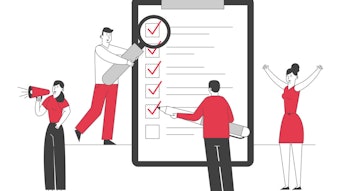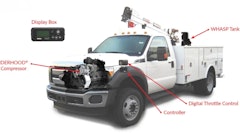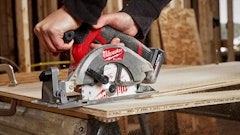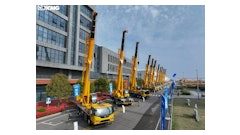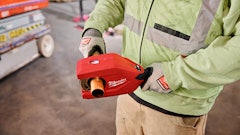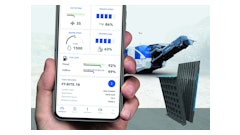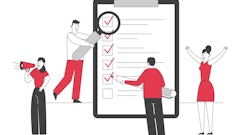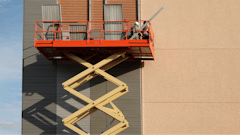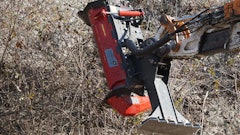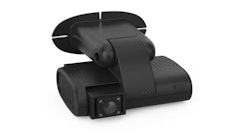In any small business, the telephone is a lifeline to success. Yet, for many small equipment rental businesses, the telephone is seen as a nuisance. It seems to ring at all the wrong times, and the incoming calls interrupt important work that needs to be done. Or do they?
The truth is that most of your sales originate from a telephone call. Calls can be distracting, but without them you would be out of business. So, let's consider eight ways to use the telephone to your advantage. Follow these eight suggestions and you should see tangible benefits in your rental business.
Get your number out to the public
Telephone accessibility for your clients and prospects to you is a key component in the marketing plan for any service-oriented business. In fact, most rental businesses can't afford to spend a lot of money on marketing and, frankly, don't need to. But it's imperative that you take every opportunity to let your customers know how to reach you. The phone book is the first place to start. You should get an automatic listing in the business section of your local phone book. As for the Yellow Pages, you should consider a modest display ad in addition to the normal listing. The Yellow Pages will be your best source of "cold calling." A good display ad will draw several calls a year from prospective clients who do not know any local small equipment rental businesses. Landing a few of these per year will more than pay for an ad. The display ad should include the name of your business, location, hours, areas of specialty (i.e. equipment available for rental) and telephone, fax and e-mail number.
Keep your telephone system up to date
Have you ever called a business and gotten a busy signal? Or maybe you've had the phone ring 15 times before it's answered. Is this happening in your shop? If it is, it's time for a new phone system. In keeping with the "your telephone is your lifeline" theory, it's vitally important that you keep that lifeline completely open. It will not be nearly as valuable if your phone system is out of date and can no longer handle the volume of calls coming in. Here are a few pointers regarding what your telephone system should and should not include:
First impressions are critical
Many calls that come into your shop are from people you don't know at all or with whom you have infrequent contact. So, the first impression of the caller is critical. It's recommended that you have a central line that is answered by a salesperson or clerk first. Most people like to at least have the option of talking with a human.
If the designated person who answers the telephone is already on the phone or out, it is best to have the call automatically roll to another line. If this isn't possible because everyone is busy inside the shop, have a cordial message programmed into the system to automatically answer the call and explain that no one is available to take the call but that it will be returned promptly if they will leave a message. As previously mentioned, a busy signal or no answer at this point in the telephone call process will likely mean a lost sale, particularly given the often urgent nature of calls in the equipment rental business.
Is the person who usually answers your phone pleasant? Try this. The next few times you call into your shop, pay close attention to the tone of voice and actual greeting used by the person answering. You might also want to check with some clients that you know well and ask them what they think of your telephone response system. They are likely to provide frank input as to whether the first impression left with your clients is positive or negative.
Be direct and honest
So, your assistant has routed a call to you or you're returning a voice mail message. What happens next? Well, if you aren't careful, you really can blow it. No matter how busy you might be, do not ever give the client the impression that he has interrupted you or that you are in a hurry to get off the phone. Be polite. Find out from the customer exactly what is needed in terms of equipment rental. Ask any questions that are pertinent and then give the customer the opportunity to ask you any questions. When it comes time to discuss the fee and availability of the equipment to be rented, try to under-promise and over-deliver. Following the opposite credo has tarnished the reputation of many a rental equipment business.
Follow the sundown rule
This one is simple, but might be the most important one on the list. No matter what system you use to gather phone messages, you should be committed (a little bit obsessive if need be!) to returning all telephone calls promptly. In fact, the Sundown Rule should be followed whenever possible. The Sundown Rule simply means that all telephone calls are returned the same day on which they are received. While you might not get to the ones that come in after 5:00 p.m., you should be able to return most calls on the same day they are received.
Train your employees
It's important to let your employees know (1) that good telephone manners are essential; and (2) what exactly you expect them to say on the phone. If you have a scripted greeting that you would like to see used, share it with the appropriate employees. Likewise, make sure you have a plan for handling call transfers, message taking (if you have ever been given a message with a wrong return number, you know how important this is!), voice mail messages, etc. It's also important to let employees know what they are not to say on the phone. You may not want some employees quoting rental rates or availability. So, make sure all employees are aware of what they can and cannot discuss. Along the same lines of training employees, make sure you pay close attention to an applicant's potential telephone voice in making hiring decisions.
The cellular phone as a sales tool
Unless your name is Rip Van Winkle, you undoubtedly own a cellular phone (or several) by now. But have you checked with your cellular provider lately to see about updating your service? Many of the new services out there will help you increase your revenues by making you and your employees more accessible. Some of these services include fraud protection, multiple phones on the same line, walkie-talkie capability, paging, voice mail, call forwarding, no-answer transfer, digital service and conference calling. There also are improved hardware options that make cell phones easier and safer to use. Headsets and speaker cell phones are now sold that make talking in a vehicle much safer. Other suggestions regarding cell phone usage include price shopping different providers in your area, providing your cell phone number in your voice mail message when you're out, always keeping the cell phone on when you're in the car, and making sure the cell phone service you choose covers your whole geographical service area.
Special considerations for micro-sized businesses
Of course, some equipment rental businesses are very small and employ five or fewer employees. This presents a whole different set of challenges in terms of telephone service and etiquette. Here are some key considerations regarding telephone usage for the owner of a micro-sized equipment rental business:
Are you confident that your telephone system and etiquette are as client-friendly and as efficient as they should be? If not, try implementing some of the recommendations covered here. If you do, you are likely to see an increase in sales and a better bottom line in your equipment rental business.

